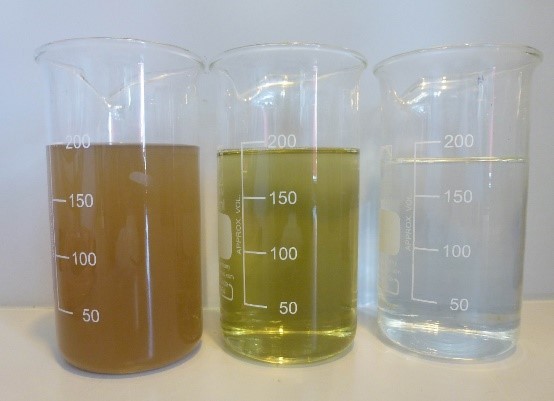Elimination of pesticides from wastewater
 Raw wastewater from the production of pesticides, effluent after membrane bioreactor treatment, effluent after nanofiltration step
Raw wastewater from the production of pesticides, effluent after membrane bioreactor treatment, effluent after nanofiltration step
Pesticides have - naturally - a direct impact on ecosystems. This impact is increasingly considered as a critical factor in many countries, because pesticides act not very specific and are often persistent. Moreover, they are transferred from agricultural areas by the water path to other natural areas, where they continue having an impact. Increasingly, pesticides are also found in drinking water and pose a health risk for the general public.
The German wastewater expert WEHRLE Umwelt has started to develop processes for the elimination of pesticides from wastewater. In a first step, wastewater from an American production site for pesticides was examined. The wastewater contained a cocktail of numerous pesticides in various concentrations and forms (herbicides, fungicides, insecticides, etc.).
First, the wastewater from the pesticides production was examined in an an eight-week continuous degradation trial. In a laboratory membrane bioreactor (MBR), the COD was successfully and stably reduced by more than 60 % during the whole test period. 99 % of the residual COD of the MBR effluent was retained by a succeeding nanofiltration (NF) and then removed from the NF-concentrate by activated carbon.
A closer look at the exemplarily selected individual substances Glyphosate, Tebuconazole and 2,4D (2,4-Dichlorophenoxyacetic acid) showed that different processes have to be combined to successfully eliminate pesticides from wastewater. Each of the examined pesticides showed its own reaction during MBR – nanofiltration – activated carbon processes. With the appropriate combination of processes, all three pesticides were removed from the wastewater by more than 98 %.
WEHRLE continues researching this topic in order to offer reliable and sustainable treatment concepts for the production wastewater of pesticides production companies.
